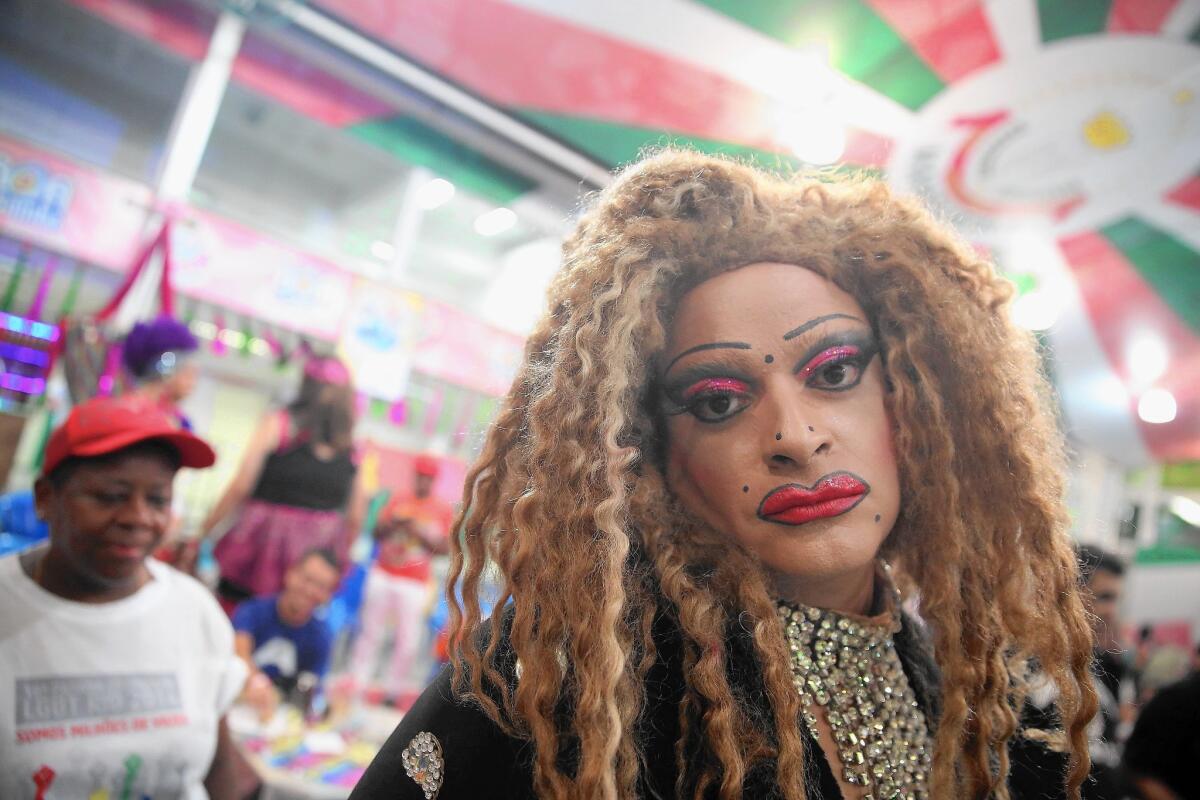Homophobic attacks increase in seemingly gay-friendly Brazil

- Share via
reporting from Sao Paulo, Brazil — Sheylla Lopes, a 19-year-old transgender woman, was walking down the street, talking on her cellphone when without warning a man came up from behind and slapped her in the face.
Lopes says the daytime attack in central Sao Paulo, which knocked her phone to the ground, was relatively minor, something she expected might happen when she began to dress and live as a woman several years ago.
She was more concerned, she said, about what could happen to her while plying her trade as a sex worker.
“We face every type of risk. We’ve all heard about attacks on friends or colleagues close by,” says Lopes, who prefers not to discuss the masculine name she had early in life. “We all know we could die on the streets.”
Sao Paulo is host to the world’s largest gay rights parade, and during Carnaval, many men in drag gleefully partake in the festivities. Yet despite its international image of sexual freedom, Brazil has a deeply conservative streak and increasing homophobic violence.
Gay rights groups said that in 2014, based on a count of news reports and legal cases, the pace of killings in a homophobic or transphobic attacks in Brazil was close to one a day. Transvestites and transsexuals were the victims in almost half of the cases.
During her reelection campaign last year, President Dilma Rousseff pledged support to a long-delayed initiative to criminalize homophobia and classify attacks motivated by sexual orientation under the same criminal status as racist violence. But thanks to a recent turn to the right in Congress, powered in part by the rise of politicians tied to Evangelical Christian churches, passage of the bill is now uncertain. Its ultimate fate may help redefine Brazil’s moral identity.
“Brazil is an extremely contradictory country. On the one hand, we are a pink country, celebrating sexual diversity and showing gay couples easily on our telenovelas,” said Luiz Mott, founder of the Grupo Gay da Bahia, an LGBT rights group. “Then, there is another color, the red blood of victims. Brazil has unfortunately inherited deep institutional and cultural homophobia over hundreds of years ... and the country has become characterized by extreme violence and rising numbers of murders.”
According to his group’s 2014 homicide report, at least 326 lesbians, gays, bisexuals and transsexuals were killed in attacks related to their sexual orientation last year, up from 159 in 2004. Last year, 163 victims were gay men and 134 were transgender individuals. The most deaths occurred in Sao Paulo state, the country’s most populous. Per capita, the deadliest state was Paraiba, in the northeast, where Lopes grew up.
The group points out that in addition to the direct attacks listed in their report, homosexual and transgender Brazilians suffer from institutional homophobia that “pushes them to the margins of society, where violence is endemic.” Sex work, already risky in Brazil, is much riskier for transgender women, Mott says.
Then there are the more minor abuses. At Carnaval celebrations this year in Olinda, in the state of Pernambuco, Magno da Costa Paim said he was kissing his boyfriend during a street party when police approached them.
“The officer slapped me in the face,” Costa Paim said a few days later. “He said, ‘Get out of here ... get out of here,’” uttering a slur sometimes used against homosexual men.
Proposed anti-homophobic legislation has been frozen in Congress for more than eight years, but Jean Wyllys, Brazil’s only openly gay legislator, has said he will present a new initiative this month, and hopes Rousseff’s support will move it forward.
“We’re in a battle to create a law that protects gay and trans Brazilians and that severely punishes those that violate their rights,” Wyllys said by phone from Brasilia, Brazil’s capital. “But Brazil is a very conservative country, and that conservatism has grown in the last few years, especially due to fundamentalist Christians that have become active in politics.”
Both Rousseff and Wyllys suffered a setback early this year when Congressman Eduardo Cunha was elected president of Brazil’s lower house. Rousseff, politically weakened by a corruption scandal at the state-run Petrobras oil company, was surprised by the unexpected election of Cunha, a conservative member of the ruling coalition and an Evangelical Christian who has spoken out against Brazil’s gay rights movement.
When a telenovela featured two men kissing, Cunha took to Twitter to express his “repulsion.” He later said that Brazil was “living through attacks, from gay pressure, marijuana smokers and abortionists.”
Cunha has the power to decide which bills are voted on. His office did not reply to interview requests or written questions on proposed anti-homophobia legislation, but the new House president used his position after taking over to push a different project: the creation of “Heterosexual Pride Day.”
Recently, Lopes, who says she became a prostitute because it would have been difficult to get a more conventional job, was working her first Carnaval. It went fine, she said, but she’d take any more security offered.
“The more protection we can get, the better,” she said. “To us, that’s just obvious.”
Bevins is a special correspondent.
More to Read
Sign up for Essential California
The most important California stories and recommendations in your inbox every morning.
You may occasionally receive promotional content from the Los Angeles Times.













